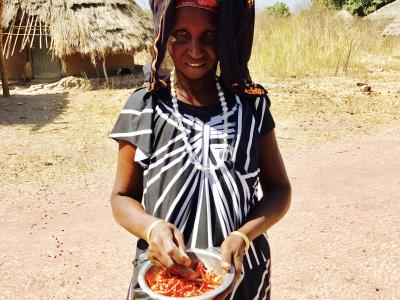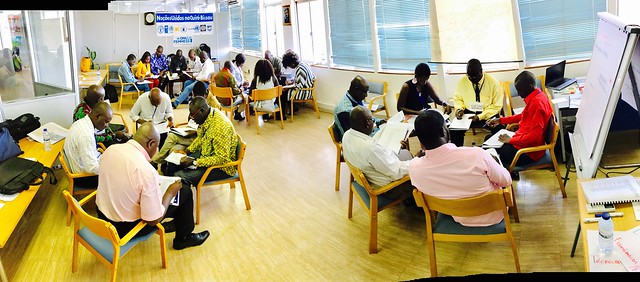Empowering local communities is key to advancing the NAP process in Guinea-Bissau

28 February 2017, Guinea-Bissau – The risks of climate change are very real for the people of Guinea-Bissau. Two out of three people live in poverty in this small country on the West Coast of Africa, and climate risks such as diminishing rainfall, temperature rise, and aquifers and rice fields that are flooded with salt water threaten to derail efforts to reduce poverty, protect food security and build a resilient nation.
With the goal of supporting the government to build a roadmap for Guinea-Bissau’s National Adaptation Plan (NAP), UNDP is working to connect government, departments, stakeholders from across civil society, the private sector and various branches of government.
With the endorsement of the Minister of the Environment and Sustainable Development, H.E. Antonio Serifo Embalo, the Government of Guinea-Bissau led an inception workshop this late January and early February to identify and plan for technical support activities and the multi-sectoral cooperation needed to formulate and implement Guinea-Bissau’s NAP processes.
Climate change planning requires engagement across a wide range of actors. This inception workshop brought together stakeholders from public, private and civil society entities representing various sectors in Guinea-Bissau, including economy and finance, agriculture, water resources, environment, forestry, biodiversity, women and children, among others.
“This national initiative will serve as a catalyst to consolidate our National Adaptation Planning process, making our communities, our people and our livelihoods more resilient to the risks of climate change,” said Guinea-Bissau’s Minister of the Environment Serifo Embalo.
“UNDP support will build a series of engagements and capacity development activities to strengthen the local understanding and knowledge on the risks of climate change, giving local stakeholders the training and tools they need to build an effective National Adaptation Plan (NAP),” said Mr. Gabriel Dava, UNDP Deputy Resident Representative in Guinea-Bissau.
Creating Positive Impact in Guinea-Bissau
With support from UNDP, national efforts to build resilience to climate change are already creating real impact on the ground.
“Guinea-Bissau is already mainstreaming climate change adaptation into our agriculture and water resources’ planning, and we have a strategy and plan of action to gain sustainable financing for climate change adaptation,” said Embalo.
Near the eastern frontier, a UNDP-supported Global Environment Facility-funded project in Gabú supports sustainable cattle raising, agriculture and the use of biogas (from cow dung) to build more resilience for smallholder ranchers and farmers in the region.
“The biogas generators not only lower carbon footprints and ups the ante to Guinea-Bissau’s Nationally Determined Contribution, but it also provides valuable cooking energy that local people can use to cook dinner and feed their families and light for the school and homes,” said Dava.
Diversification and improved market access will also be key in adaptation planning. For farmers from Gabú like Bobo, technical support means she can now sell piri-piri. With the revenues from her crops, Bobo was able to buy a mattress, and this year, her son will marry.
“With healthier crops, healthier cows, and better resilience to climate change, these smallholder farmers are making more money, and gaining the knowledge they need to climate-proof their futures,” said Rohini Kohli, Lead Technical Specialist, NAP’s at UNDPs Global Environmental Finance Unit.
Supporting National Adaptation Plans
Financed by the Global Environment Facility (GEF) Least Developed Countries Fund (LDCF), the joint UNDP-UNEP NAP-Global Support Programme and its partners and collaborators are assisting Least Developed Countries like Guinea-Bissau to identify technical, institutional and financial needs to integrate climate change adaptation into ongoing medium- and long-term national planning.
Across the globe, UNDP is supporting countries with one-on-one technical assistance to identify specific needs, capacity gaps and suggest next steps in regards to advancing National Adaptation Plan (NAP) processes. This tailored support complements NAP-GSP activities that are focused on region-based technical training, awareness-raising, and knowledge sharing and exchange.
“The National Adaptation Plan process is about bringing together stakeholders from across society to build integrated systems that support farmers like Bobo in building a better life, to support decision makers in building better policies, and to support society in building a better planet,” said Kohli.
Photos
